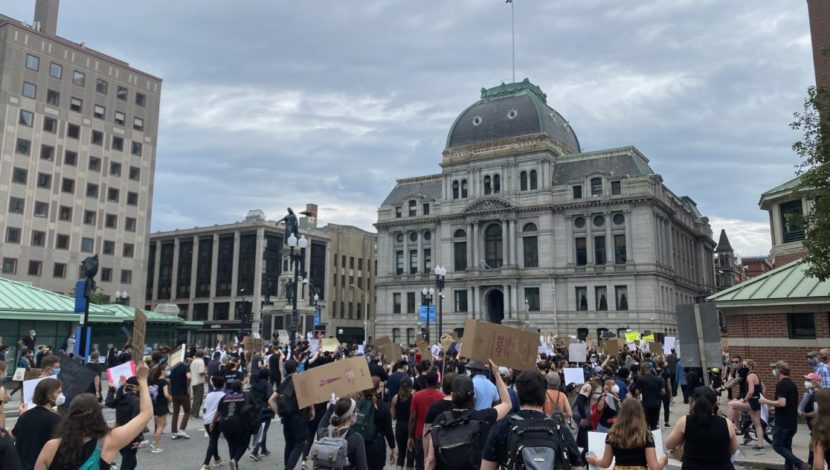The Unitarian Universalist Service Committee advances human rights through grassroots collaborations.
New Year Offers New Chance to Advance Human Rights

By on January 5, 2021
2020 was a year of overlapping crises: systemic racism and anti-Blackness; a global pandemic triggering a rise in poverty and other forms of deprivation; new threats to voting rights and the democratic process; the evisceration of asylum and humanitarian protection; and the ongoing violence of policing and the carceral state—in which long-term detention and imprisonment have become even more deadly as a consequence of COVID-19. While each of these challenges is distinct, none can be disentangled fully from the others.
The result of these compounding crises has been a global “human rights recession” unlike any in recent history. In the United States and around the world, rights have been in retreat, with authoritarian governments, nationalistic demagogues, and hawkers of false solutions rushing in to fill the void left by fear and the loss of hope. Hard-fought gains for migrants’ rights, climate justice, and collective dignity—the result of decades of toil on the part of grassroots human rights defenders—seemed to vanish in a night.
But, as a 19th-century Unitarian poet once wrote: “if hopes were dupes, fears may be liars.” The message of the poem in which this line first appeared is that moments of apparent defeat can be misleading. Hopeless as they may seem in the moment, they often contain the seeds of future victory. Already, as the calendar year turns to 2021, we are seeing signs that the tide of the human rights struggle may be turning once again. Here are a few of the opportunities we look to in the year ahead:
Legislation to Address Survival Needs During the Pandemic
After unconscionable delays and political brinkmanship—which interrupted crucial economic lifelines in the midst of a pandemic and may have cost lives—the second COVID-19 relief bill has finally become law. This legislation, while deeply flawed and far-too limited in scope, nonetheless includes many priorities that UUSC fought for over the course of months: protections from evictions and foreclosures, greater nutrition assistance and other support for human needs, and broadband expansion for rural and Indigenous communities that is particularly vital during the pandemic. It also extends a rapidly-expiring deadline for some Liberian refugees to obtain permanent residency—a long-standing advocacy focus of our partners the UndocuBlack Network.
Further, the relief package partially repairs the damage of one of the most cruel provisions of the earlier CARES Act (the previous major pandemic relief legislation), which left out many immigrants and mixed-status families from receiving survival checks needed to weather the pandemic. Under the prior bill, tax-paying immigrants without a social security number and many members of their household were denied the ability to receive these urgently-needed payments, even if the latter were U.S. citizens.
The new relief bill goes part of the way toward redressing this injustice, ensuring that U.S. citizens who file taxes jointly with immigrant spouses using individual tax-payer numbers will no longer be denied stimulus payments. Moreover, the legislation retroactively makes up for payments these individuals lost due to the earlier CARES Act exclusion. Sadly, however, it still does not provide relief checks to noncitizens who lack a social security number, regardless of their contributions as taxpayers and members of U.S. society. This grave injustice must be remedied by future legislation.
Overall, the bill—part of an enormous year-end spending package that also funds the federal government as a whole—is very far from our ideal legislation; yet the fact that it has made it even this far is a testament to the efforts of grassroots advocates. As a new Congressional term begins on January 3, we see opportunities to build on this foundation—ultimately to provide a more substantial, just, and transformative policy response to the COVID-19 pandemic.
Executive Action to Restore Asylum and Advance Migrant Rights
The start of the new year also places us within weeks of the arrival of a new presidential administration that has pledged to make asylum and the human rights of refugees a priority. Of course, the Biden/Harris team will face many challenges addressing the humanitarian crisis created by Trump’s closure of asylum processing at the border. This task will therefore require sustained commitment, and it is concerning, in this regard, that members of the incoming administration have already shown signs of wavering, suggesting for instance that they may slow-walk the lifting of some of Trump’s worst anti-asylum measures.
While our work is therefore far from complete, a change of leadership in Washington does hold out the possibility of new action to protect existing rights and advance migrant justice. In this task, restoring the right to asylum—as it is supposed to exist under U.S. and international law—is a first but vital step. It can be accomplished immediately by ending discretionary executive-branch policies including “Remain in Mexico,” Title 42 expulsions, and third-country asylum agreements.
Biden and Harris should then move beyond these initial actions to: 1) end the detention of immigrants and asylum-seekers, particularly during a deadly pandemic; 2) provide immediate relief from deportation (including via Temporary Protected Status (TPS)) for people from countries facing humanitarian crises and natural disasters; and 3) work with Congress to create a path to citizenship, decriminalize border crossings, and make other urgently-needed legislative reforms.
New Initiatives to Promote Environmental and Climate Justice
The incoming administration has also made important commitments to environmental justice and addressing the global climate crisis. After four years of outright climate denialism and the evisceration of many of the basic environmental protections that shield our communities from poisoning, ensure the consultation of affected people in major development projects, and mitigate climate destruction, these words are a welcome change. However, as with the new administration’s promises on asylum, words alone are not enough. They must be backed up by swift action, once the Biden/Harris team takes office.
In fulfillment of these promises, UUSC will be calling on the Biden/Harris White House to take the following steps: 1) commit the U.S. government to contribute its fair share of carbon mitigation (both through cutting our own economy’s emissions and funding the adaptation and clean energy needs of societies in the Global South, who face the most severe effects from climate change despite contributing the least to carbon emissions); 2) eliminate environmental racism and ending environmental “sacrifice zones,” by strengthening community consultation and restoring regulatory oversight of high-polluting industries that disproportionately harm low-wealth Black and Brown communities; and 3) honoring Indigenous cultural and subsistence rights, including by halting drilling and construction of new fossil fuel infrastructure on federal lands.
We don’t know precisely if and when these opportunities will be fulfilled in the coming year. But as the poet remarked above, if hopes are sometimes mistaken, fears can also be deceiving. The year just behind us gave us many reasons to fear. But as we look ahead to what’s in store, we also have cause to hope.
***
About UUSC: Guided by the belief that all people have inherent worth and dignity, UUSC advances human rights globally by partnering with affected communities who are confronting injustice, mobilizing to challenge oppressive systems, and inspiring and sustaining spiritually grounded activism for justice. We invite you to join us in this journey toward realizing a better future!
Photo Credit: Josh Leach, UUSC

